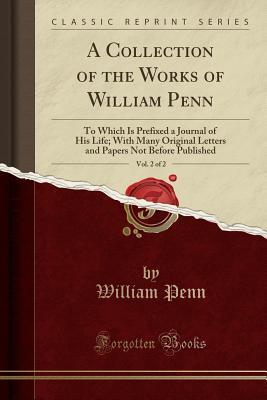- Bible
- Read the Bible
- Bible Versions
- Verse of the Day
- Reading Plans
- Verses by Topic
- Books of the Bible
- Bible Images
- Study
- Commentaries
- Concordances
- Dictionaries
- Encyclopedias
- Sermons
- Bible Atlas & Maps
- BP Wiki
- Devotionals
- Today's Devotionals
- Light of the World
- All Devotionals
- Inspirational Quotes
- More
- Picture Quotes
- Videos
- Inspirational
- Bible Study
- What The Bible Says
- Bible Q&As
- Daily Bread
- Bible by Genre
- Bible Stories
- Random Bible Verse
- Community
- Store
Excerpt from A Collection of the Works of William Penn, Vol. 2 of 2: To Which Is Prefixed a Journal of His Life; With Many Original Letters and Papers Not Before Published
Ihave the longer infilied on this Particular, becaufe molt material, as well to dereei his Weaknel's and grand Inability to the Work he forwardly has underta ken, as from his own Expreflions to elucidate and maintain the Qcakere Principles to be Orthodox Although it was againll them he mainly did deftgn his Book; but with what Succefs the End will manifeli. I (hall jult hint upon his three Branches, into which he has fplit the firli A61 of his Eleflion. (1) He advifes to take a particular View of the Principal Doflriner and Myflcrie: of Faith, and Da ty of Godlinefs taught in the Scriptures; but doth not tell us by what infallible Expofitor we ought to erufe them, that might unfold thole Mylleries he fpeaks of (which imply a dubious, intricate and obfcure Senfe) does he mean the In liine} beforementioned I fear he is fcarce lo Orthodox, or will he have us give our own Conllruetions as Things prefent themfelves to our.natural Underfianding or mull we walk by the Crutches of fome Commentators For if he will at Mt (end all to the Scriptures, or can pr0pofe no better Expedient to reconcile thefe Breache es, and heal thole Religious, Jars, than that which through Men's Blindnefs (and for want of the infallible Spirit which guides all in the Truth that receive it, and are (ubjeeied thereunto) has been the very Rife and Grouud of them, the World will belittle beholding to this Guide.
About the Publisher
Forgotten Books publishes hundreds of thousands of rare and classic books. Find more at www.forgottenbooks.comwww.forgottenbooks.com
This book is a reproduction of an important historical work. Forgotten Books uses state-of-the-art technology to digitally reconstruct the work, preserving the original format whilst repairing imperfections present in the aged copy. In rare cases, an imperfection in the original, such as a blemish or missing page, may be replicated in our edition. We do, however, repair the vast majority of imperfections successfully; any imperfections that remain are intentionally left to preserve the state of such historical works.
Ihave the longer infilied on this Particular, becaufe molt material, as well to dereei his Weaknel's and grand Inability to the Work he forwardly has underta ken, as from his own Expreflions to elucidate and maintain the Qcakere Principles to be Orthodox Although it was againll them he mainly did deftgn his Book; but with what Succefs the End will manifeli. I (hall jult hint upon his three Branches, into which he has fplit the firli A61 of his Eleflion. (1) He advifes to take a particular View of the Principal Doflriner and Myflcrie: of Faith, and Da ty of Godlinefs taught in the Scriptures; but doth not tell us by what infallible Expofitor we ought to erufe them, that might unfold thole Mylleries he fpeaks of (which imply a dubious, intricate and obfcure Senfe) does he mean the In liine} beforementioned I fear he is fcarce lo Orthodox, or will he have us give our own Conllruetions as Things prefent themfelves to our.natural Underfianding or mull we walk by the Crutches of fome Commentators For if he will at Mt (end all to the Scriptures, or can pr0pofe no better Expedient to reconcile thefe Breache es, and heal thole Religious, Jars, than that which through Men's Blindnefs (and for want of the infallible Spirit which guides all in the Truth that receive it, and are (ubjeeied thereunto) has been the very Rife and Grouud of them, the World will belittle beholding to this Guide.
About the Publisher
Forgotten Books publishes hundreds of thousands of rare and classic books. Find more at www.forgottenbooks.comwww.forgottenbooks.com
This book is a reproduction of an important historical work. Forgotten Books uses state-of-the-art technology to digitally reconstruct the work, preserving the original format whilst repairing imperfections present in the aged copy. In rare cases, an imperfection in the original, such as a blemish or missing page, may be replicated in our edition. We do, however, repair the vast majority of imperfections successfully; any imperfections that remain are intentionally left to preserve the state of such historical works.
BUY NOW
Paperback, 934 pages
Published October 16th 2018 by Forgotten Books
© 2025 Bibleportal.com All rights reserved.

William Penn was an English founder and "Absolute Proprietor" of the Province of Pennsylvania, the English North American colony and the future U.S. State of Pennsylvania. He was known as an early champion of democracy and religious freedom and famous for his good relations and his treaties with the Lenape Indians. Under his direction, Philadelphia was planned and developed.
As one of the earlier supporters of colonial unification, Penn wrote and urged for a Union of all the English colonies in what was to become the United States of America. The democratic principles that he set forth in the Pennsylvania Frame(s) of Government served as an inspiration for the United States Constitution. As a pacifist Quaker, Penn considered the problems of war and peace deeply, and included a plan for a United States of Europe, "European Dyet, Parliament or Estates," in his voluminous writings.
... Show more